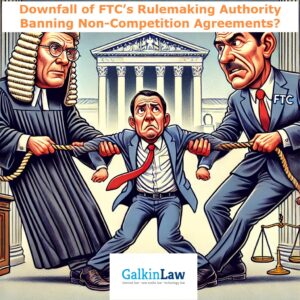
As of May 2024, several lawsuits have been filed in federal court challenging the Federal Trade Commission’s (FTC) authority to ban non-compete agreements in employee contracts. The FTC issued a final rule banning non-compete clauses on April 23, 2024.
The lawsuits allege that the FTC lacks the authority to pass the rule on constitutional and statutory grounds. The lawsuits ask for orders to delay the rule’s effective date, which is September 4, 2024, and to prevent its enforcement. The rule applies retroactively to non-competes that were already in place before the rule’s passage, with the exception of senior executives.
The Supreme Court’s June 28th ruling abandoning of the Chevron Deference could significantly impact challenges to the FTC’s authority to ban non-compete restrictions. Chevron Deference, established by the Supreme Court in the 1984 case Chevron U.S.A., Inc. v. Natural Resources Defense Council, Inc., directs courts to defer to a federal agency’s interpretation of ambiguous statutory language, provided the interpretation is reasonable.
Without the Chevron Deference, courts may not automatically defer to the FTC’s interpretation of its statutory authority to ban non-compete clauses. This would subject the FTC’s rule to stricter judicial scrutiny, requiring courts to independently interpret the statutory provisions without deferring to the FTC’s expertise.
The FTC’s authority to ban non-compete agreements relies on its interpretation of Section 5 of the FTC Act, which addresses unfair methods of competition. A shift away from Chevron could lead courts to narrowly interpret these provisions, potentially limiting the FTC’s ability to enact broad regulations without explicit congressional authorization.
What should companies do while this uncertainty remains? Nothing – sit tight and just validate that all non-competition agreements comply with current applicable state law.
